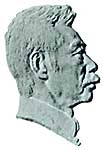 |
Hey Ayi,
Every year when the Nobel Prize committee convenes to choose the
laureate for literature, the name of the early 20th-century Chinese
writer Lu Xun comes up. As his work is inaccessible to us Chinese
illiterates, please edify me on the significance of this famous
scribe.
Sign me,
Q-ball |
Dear Ah Q,
Many Chinese-even Chairman Mao in his more lucid moments-consider Lu
Xun to be the greatest modern Chinese writer. The Party sanctified him
as a revolutionary proletarian cultural worker, but his roots were not
all that red: he was born in 1881 to a land-owning family. "I remember
when I was very young, my family was not so poor, we had 200-300 hectares
of land," Lu wrote of his landlord background.
Despite his feudalist origins, Lu Xun's writing was revolutionary in
more than one sense of the word: Not only did he tirelessly satirize
and criticize the inequalities and injustices of pre-Liberation China,
but he was the first serious Chinese writer to use vernacular language
for literary purposes. Until Lu Xun's caustic modern prose shocked the
Chinese literary world into the 20th century, scholars and writers were
expected to write in classical Chinese which is as easy for the average
Chinese person to understand as ancient Greek is for the average laowai.
Lu Xun's real name was Zhou Shuren, but like many Chinese writers he
is much better known by his adopted pen name. As a medical student in
Japan from 1904 to 1912, he was among China's first generation of liuxuesheng-students
who go abroad. But he abandoned his medical career, deciding that China
needed "spiritual medicine" more than the physical variety.
He settled in Beijing where he began writing prolifically-stories, poetry,
essays and literary criticism. Many of his most biting essays were published
in small weekly cultural magazines, many of which he published and edited
himself. He produced three volumes of short stories. Call to Arms (Na
Han) is the most famous collection, containing a story called The True
Story of Ah Q (°¢QÕý´« ). Written in 1921 when the author was living
in Beijing, The True Story of Ah Q recounts the tragically ironic life
and death of Ah Q, a cowardly, greedy, selfish, envious, short-sighted
country bumpkin in a small village. Ah Q is disgusting to look at; he
has shiny ring-worm scars on his scalp that he is so embarrassed about
that the words 'ringworm', 'shiny', 'bright' and by extension 'lamp'
are all taboo for him. If someone says one of these words to Ah Q, he
picks a fight, but only if the person looks weak. But even the weak-looking
people usually get the better of Ah Q.
Ah Q is a loser in all aspects of his short brutal life, but when Chinese
people talk about 'Ah Q spirit' (Ah Q Jingshen), they are usually referring
to Ah Q's most infamous characteristic-failing completel while seeing
the failure as success and even gloating about it.
In 1926, Lu Xun left Beijing for Shanghai, where he wrote poetry and
satirical essays (zawen). Increasingly opposed to the Nationalist government,
he helped found the League of Left Wing Writers in 1930, and supported
the fledgling Communist Party.
He died of tuberculosis on October 19, 1936, leaving behind an oeuvre
of work that provides an accurate picture of the inequities of pre-Liberation
China, althugh you could replace that 'pre-' with a 'post' and be just
as precise.
One of your Ayi's favorite Lu Xun quotes is about weekly newspapers.
The great essayist wrote: "Today there are all kinds of weeklies. Although
their distribution is not very wide, they are shining in the darkness
like daggers, letting their comrades know who is attacking the old,
strong castles." He was, of course, referring to left wing political
magazines in 1930s Shanghai.
Lu Xun's Beijing residence is open to the public daily, 9 am-4:30 pm.
Beijing Lu Xun Museum, 19 Gongmenkou Ertiao, Fuchengmenwai Dajie, Xicheng
District.
|
|
Previous Stories
Mama
Africa
Ghosts
and Foxy Ladies
Ayi
gets testy
Ayi
in Control
Creation
Ayi
Ayi picks up
Internet losers
(and winners)
Traditional
Chinese exercise
Flyin'
high
Is
the plural of abacus 'abuci'?
|